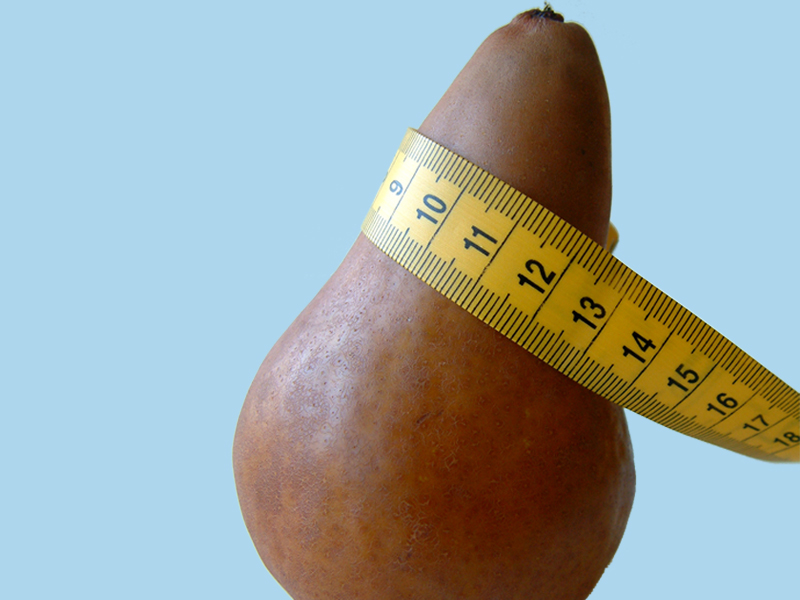Get Easy Health Digest™ in your inbox and don’t miss a thing when you subscribe today. Plus, get the free bonus report, Mother Nature’s Tips, Tricks and Remedies for Cholesterol, Blood Pressure & Blood Sugar as my way of saying welcome to the community!
Is a pear shape just as bad for your heart as a belly bulge?

Where you hold your fat can reveal a lot about your health…
If you hold more fat in your middle, you have a higher risk for obesity-related cancers, like postmenopausal breast, colorectal, lower esophagus, stomach, liver, gallbladder, pancreatic, endometrial, ovarian and kidney cancers. You also have a higher risk of heart disease.
If you hold more fat in your lower half, on the other hand, you’re a little better off. Past studies show that holding fat in your butt, hips and thighs seems to protect you from heart disease.
But I have bad news for all the pear-shaped people out there. Your curvy lower half may not be protecting you as much as you thought…
It turns out belly fat isn’t the only body fat that’s bad for the heart, after all…
A slimmer lower half is better for your heart
Apparently, the heart-protecting powers of a pear-shaped body aren’t all they’re cracked up to be…
A recent review from researchers at the University of South Australia and a researcher at the National Health and Medical Research Council of Australia found that losing fat in your butt, hips and thighs can improve your heart health.
They looked at data from 399 people who participated in seven weight loss studies. And people who lost belly fat weren’t the only ones who walked away with better health…
People who lost weight in their lower half improved glucose, insulin, cholesterol, triglycerides, and blood pressure levels — all important measures of heart health.
In fact, when it comes to lowering cholesterol, researchers found that losing weight in the legs is just as effective as losing weight in the midsection.
They made one other surprising discovery…
Losing muscle didn’t hurt heart health. This was surprising because higher muscle mass is typically tied to a healthier heart. But in this review, losing weight was beneficial whether it was muscle or fat.
Losing weight for a healthier heart
How do you know if you need to shed a few pounds in the name of better heart health? And how much do you need to lose?
Well, if your BMI places you in the overweight (BMI of 25-29) to obese (BMI of 30 or above) category, losing five to ten percent of your body weight would improve your heart health a lot.
Even if you’re not technically overweight, shedding a few pounds could help your heart health if your glucose, insulin, cholesterol, triglycerides and blood pressure levels are less than perfect.
But once you set out on your weight loss journey there’s one thing you shouldn’t worry about… where the weight is coming off. All this talk about belly fat and lower body fat makes it sound like you need to target specific areas for weight loss, but the truth is that’s impossible. Your body will shed weight where it wants to shed weight, and that’s perfectly fine.
Understanding the health risks associated with your body type is helpful, but don’t let it make you crazy about losing fat in a certain area. That will just cause frustration, stress and an unhealthy mindset about weight loss. Eat healthy, exercise and trust that your body will do what it needs to do to keep you healthy, heart and all.
Editor’s note: There are perfectly safe and natural ways to decrease your risk of blood clots including the 25-cent vitamin, the nutrient that acts as a natural blood thinner and the powerful herb that helps clear plaque. To discover these and other secrets of long-lived hearts, click here for Hushed Up Natural Heart Cures and Common Misconceptions of Popular Heart Treatments!
Sources:
- Losing ‘protective’ fat in thighs, buttocks good for the heart — MedicalXpress. Retrieved April 12, 2018.
- N. Manolopoulos, et al. “Gluteofemoral body fat as a determinant of metabolic health.” — International Journal of Obesity, 2010.
- Higher muscle mass associated with lower mortality risk in people with heart disease — ScienceDaily. Retrieved April 12, 2018.













